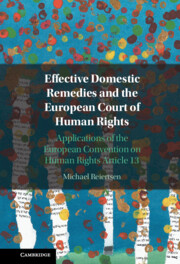 Effective Domestic Remedies and the European Court of Human Rights
Effective Domestic Remedies and the European Court of Human Rights Published online by Cambridge University Press: 11 August 2022
Chapter 3 explains how any evaluation of effectiveness requires the measurement of goal realization. In order to understand what an effective remedy is and could be, it is thus necessary to know the purposes the effective remedy is to serve. The chapter proceeds by explaining how remedies may have different purposes which are connected to different functions in different manners. Further, even though the Court's case law reveals that Article 13 advocates a specific form of access to justice and that the primary purpose of the required redress is to correct individual justice, it remains uncertain to what extent Article 13, also, promotes other functions and purposes, for example, to what extent the access to justice required by Article 13 has independent procedural value apart from being a prerequisite for achieving redress, to what extent Article 13 must promote general and/or individual deterrence, and to what extent Article 13 has a function of promoting and regulating the relationship between the domestic and international levels by promoting, for example, subsidiarity and the rule of law.
To save this book to your Kindle, first ensure [email protected] is added to your Approved Personal Document E-mail List under your Personal Document Settings on the Manage Your Content and Devices page of your Amazon account. Then enter the ‘name’ part of your Kindle email address below. Find out more about saving to your Kindle.
Note you can select to save to either the @free.kindle.com or @kindle.com variations. ‘@free.kindle.com’ emails are free but can only be saved to your device when it is connected to wi-fi. ‘@kindle.com’ emails can be delivered even when you are not connected to wi-fi, but note that service fees apply.
Find out more about the Kindle Personal Document Service.
To save content items to your account, please confirm that you agree to abide by our usage policies. If this is the first time you use this feature, you will be asked to authorise Cambridge Core to connect with your account. Find out more about saving content to Dropbox.
To save content items to your account, please confirm that you agree to abide by our usage policies. If this is the first time you use this feature, you will be asked to authorise Cambridge Core to connect with your account. Find out more about saving content to Google Drive.